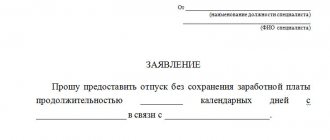The concept of administrative punishment and the conditions for its imposition
Administrative punishment is a measure of responsibility established by the state for committing an administrative offense; is used to prevent the commission of new offenses both by the offender himself and by other persons.
Based on this definition, administrative punishment may be imposed if the following conditions :
- the measure of liability is established exclusively by the state (the Code of Administrative Offenses of the Russian Federation provides for the possibility of establishing a measure of administrative liability both at the federal and regional levels (by the subjects of the Russian Federation in regional laws), but within the framework established by federal legislation);
- assigned only for committing an administrative offense. Listed in Part 1 of Art. 3.2 of the Code of Administrative Offenses of the Russian Federation, administrative penalties are applied only to persons who have committed administrative offenses. The commission of other offenses and misdemeanors (crimes; civil offenses; disciplinary offenses; tax offenses entailing the application of tax sanctions) cannot lead to the imposition of administrative punishment.
- the imposition of an administrative penalty should be aimed at preventing the commission of new offenses both by the offender himself and by other persons;
- Administrative punishment cannot be aimed at humiliating the human dignity of an individual who has committed an administrative offense, or causing him physical suffering, as well as harming the business reputation of a legal entity.
Types of administrative penalties
Article 3.2 of the Code of Administrative Offenses of the Russian Federation contains a closed list of types of administrative penalties imposed for committing an administrative offense, and also defines the basic conditions for their appointment. For committing administrative offenses the following administrative penalties may be established and applied:
- warning;
- administrative penalty;
- confiscation of the instrument or subject of an administrative offense;
- deprivation of a special right granted to an individual;
- administrative arrest;
- administrative expulsion from the Russian Federation of a foreign citizen or stateless person;
- disqualification;
- administrative suspension of activities;
- compulsory work;
- administrative ban on visiting the venues of official sports competitions on the days they are held.
Certain types of administrative offenses
For completeness and clarity of presentation of decisions on the imposition of a fine, we will consider as a sample cases of violations in construction and labor relations.
For the safety of citizens living in residential buildings or using administrative and industrial buildings, the construction industry must comply with all norms and technical regulations established for this area.
Violation of the requirements in the preparation of design documentation, special technical conditions during construction work on the construction and repair of objects may be punishable by the imposition of an administrative fine in the following amounts:
- for individuals – within 1-2 thousand rubles;
- for officials - a minimum of 20 thousand and a maximum of 30 thousand rubles;
- for organizations - varies from 100 to 300 thousand rubles.
The fines may be doubled from those established above if the violations result in more serious consequences - harm is caused to the life or health of citizens, property belonging to them or other organizations, and damage to the environment is caused.
For repeated violations, fines may increase:
- citizens up to 5 thousand rubles;
- heads of organizations or other officials up to 45 thousand;
- entrepreneurs up to 50 thousand and legal entities up to 1 million.
The labor rights of working citizens are protected by the norms of the Labor Code of the Russian Federation and the provisions of the Code of Administrative Offenses of the Russian Federation, according to which a person guilty of committing an administrative offense may be subject to financial punishment. The body that considers cases in this area is the state labor inspectorate.
Articles 5.27-5.34 of the Code of Administrative Offenses of the Russian Federation are devoted to the labor relationship between employee and employer. The case can be initiated on the basis of an application, a presentation from the prosecutor's office, or during a scheduled inspection.
If the violations are minor and eliminated before the start of the inspection, then you can limit yourself to the comments of labor safety inspectors, and in the case of more serious consequences, the authorized body is obliged to initiate a case and, based on the results of the review, impose an administrative penalty in the form of a fine.
An analysis of the protocols drawn up by employees of the Rostrudinspektsiya revealed that the majority of illegal actions are committed by employers against employees for committing disciplinary offenses. The size of fines varies from one thousand applied to citizens and up to 200 thousand rubles to an organization.
Basic and additional administrative penalties
Article 3.3 of the Code of Administrative Offenses of the Russian Federation establishes basic and additional measures of administrative liability, as well as the procedure for their appointment.
The main administrative penalties include:
- warning;
- administrative penalty;
- deprivation of a special right granted to an individual, with the exception of the right to drive a vehicle of the corresponding type;
- administrative arrest;
- disqualification;
- administrative suspension of activities;
- compulsory work.
These administrative penalties can be established and applied only as basic administrative penalties.
The following types of administrative liability measures can be applied as basic and additional measures:
- confiscation of the instrument or subject of an administrative offense;
- deprivation of a special right in the form of the right to drive a vehicle of the corresponding type (deprivation of a special right in the form of the right to drive a vehicle of the corresponding type is applied as an additional administrative penalty for committing administrative offenses provided for in Part 1 of Article 11.7.1, Parts 1 and 2 of Article 12.8, Part 1 article 12.26, part 3 article 12.27 of the Code of Administrative Offenses of the Russian Federation);
- administrative expulsion from the Russian Federation of a foreign citizen or stateless person;
- administrative ban on visiting the venues of official sports competitions on the days they are held.
Part 3 of Article 3.3 of the Code of Administrative Offenses of the Russian Federation stipulates that for one administrative offense a primary or primary and additional administrative punishment may be imposed from the penalties specified in the sanction of the applicable article of the Special Part of the Code of Administrative Offenses of the Russian Federation or the law of a subject of the Russian Federation on administrative liability. This principle is intended to exclude the possibility of double liability for the same offense.
Resolution of the Plenum of the Supreme Court of the Russian Federation dated March 24, 2005 N 5 established that when determining the punishment for an administrative offense, it is necessary to take into account the provisions of Part 3 of Art. 3.3 of the Code of Administrative Offenses of the Russian Federation on the permissible combination of types of administrative punishments for an administrative offense, bearing in mind that for a specific offense only the main or the main and one of the additional punishments provided for by the sanction of the applicable article of the Special Part of the Code of Administrative Offenses of the Russian Federation or the law of the subject of the Russian Federation can be assigned. Based on this, only one of the main punishments specified in the sanction article can be assigned as the main one, and additional administrative punishment cannot be assigned independently.
In addition, when applying these norms, it must be borne in mind that if the sanction of an article of the Code of Administrative Offenses of the Russian Federation provides for the mandatory imposition of an additional administrative punishment along with the main one, but the additional punishment cannot be assigned to the person against whom proceedings are being conducted for an administrative offense , the judge has the right to assign only the main punishment.
Commentary on Article 4.1 of the Code of Administrative Offenses of the Russian Federation
1. The commented article does not contain procedural norms concerning the procedure for imposing administrative penalties (Chapters 24 - 30 of the Code are devoted to this), but norms of a substantive nature that define conceptual provisions for imposing measures of administrative responsibility, which are based on the principles of legality, fairness and individualization of punishments.
2. The implementation of the principle of legality when imposing an administrative penalty consists, first of all, in the following: the choice of punishment is limited to an exhaustive list of measures of administrative responsibility, enshrined in Art. 3.2 of the Code; the punishment must be imposed in strict accordance with all other provisions of the General Part of the Code; Administrative punishment is possible only within the limits determined by the articles of the Special Part of the Code or the law of the constituent entity of the Russian Federation, which formulate specific elements of administrative offenses.
3. The imposed administrative punishment can neither exceed the maximum amount of punishment provided for a specific offense, nor be less than its established lower limit. The legislation on administrative offenses does not contain general regulations on the possibility of adding punishments or on imposing a punishment below the lowest limit.
For administrative offenses in the field of road traffic (Chapter 12 of the Code of Administrative Offenses of the Russian Federation) in cases provided for in Part 3 of Art. 28.6 of this Code, an administrative penalty in the form of an administrative fine may be imposed. Moreover, its amount should not exceed the minimum fine specified in the sanction of the applicable specific article of the Special Part of the Code. However, in cases where for offenses recorded by special technical means operating automatically, in the articles of Ch. 12 of the Code provides for sanctions in the form of deprivation of the right to drive vehicles or administrative arrest; an administrative fine is imposed in the largest amount provided for citizens of Part 1 of Art. 3.5 of the Code, i.e. in the amount of 5 thousand rubles.
4. Administrative punishment must be fair, i.e. correspond to the nature of the offense itself, the circumstances of its commission, property status, and the identity of the perpetrator.
The judge, body, or official considering a case of an administrative offense is given the opportunity to individualize the punishment in each specific case, since most sanctions are formulated either as alternative or as relatively specific, indicating their lower and upper limits.
The meaning of individualization of administrative punishment is to choose, on the basis of a comprehensive assessment of the act and the personality of the offender himself, within the limits of the norm providing for liability for the offense, precisely that measure of state coercion that would most effectively achieve the goals of restoring social justice, correcting the offender and preventing the commission of new illegal acts.
5. When determining the nature of an administrative offense, the significance of social relations that are the object of the offense, forms of guilt, the method of commission and the severity of the consequences of the offense, and its qualifying features are identified. More dangerous administrative offenses should entail more severe administrative penalties.
6. For the correct choice of the type and amount of administrative punishment, information about the person held accountable is of great importance: whether he committed the offense again, whether he embarked on the path of correction after committing the offense, etc. Committing an unlawful act two or more times may indicate the persistent nature of a person’s antisocial views and habits, which should lead to the application of a more severe administrative penalty.
The application of penalties such as an administrative fine, deprivation of a special right (for example, deprivation of the right to drive a professional driver) can negatively affect the financial situation of the offender and his family members. Therefore, when prescribing such measures, determining their size and timing, the property status of the person held accountable must be taken into account.
In some cases, the choice of the type of punishment may be determined not only by the social characteristics of the individual and his financial status, but also by the gender, age and state of health of the offender. For example, administrative arrest generally cannot be applied to pregnant women, women with children under fourteen years of age, persons under eighteen years of age, disabled people of groups I and II (see commentary to Article 3.9).
7. When imposing an administrative penalty on a legal entity, the nature of the administrative offense committed by it, the property and financial position of the legal entity, and circumstances mitigating and aggravating administrative liability are taken into account.
8. In paragraph 7 of Art. 14 of the International Covenant on Civil and Political Rights enshrines the most important legal principle, according to which “no one shall be tried or punished or acquitted a second time in accordance with the law and criminal procedure of each country.” This generally recognized principle of international law is transformed into legislation on administrative offenses through Part 5 of the commented article, the main meaning of which is specified in the procedural norms of the Code. Proceedings in a case of an administrative offense cannot be started, and the started proceedings are subject to termination if there is one of the following decisions regarding the same fact of commission of illegal actions (inaction) by the person in respect of whom the proceedings in the case of an administrative offense are being conducted: 1) decisions on the imposition of administrative punishment; 2) decisions to terminate proceedings in a case of an administrative offense; 3) decisions to initiate a criminal case (see commentary to Article 24.5). These norms exclude the possibility of issuing in the same case not only two or more decisions on the imposition of administrative punishment, but also issuing several other final decisions of any content. However, if a previously issued decision is canceled in accordance with the established procedure, the possibility of resuming the proceedings is allowed.
The simultaneous imposition of an administrative penalty based on the application of the norms of the Special Part of the Code, containing general and special offenses (see, for example, Part 2 of Article 11.15 and Article 19.2) should be considered as a violation of the principle enshrined in Part 5 of this article.
At the same time, the effect of Part 5 of this article does not apply to cases of imposition of additional administrative punishment along with the main one. The obligation remaining with the person undergoing punishment to fulfill those requirements for non-fulfillment of which an administrative penalty was imposed will not constitute double responsibility.
What administrative penalties are the subjects of the Federation entitled to establish?
Part 3 Art. 3.2 of the Code of Administrative Offenses of the Russian Federation specifies the provisions on the delimitation of the jurisdiction of the Russian Federation and the constituent entities of the Russian Federation, taking into account the fact that the establishment of a list of types of administrative penalties and the rules for their application falls under the jurisdiction of the Russian Federation in the field of legislation on administrative offenses (clause 2, part 1, article 1.3 Code of Administrative Offenses of the Russian Federation).
Subjects of the Russian Federation, when establishing regional norms prescribing measures of administrative liability, may provide only a warning and an administrative fine as such measures. Accordingly, only the Code of the Russian Federation on Administrative Offenses can establish all other types of administrative penalties
Officials of the territorial bodies of Rosreestr, carrying out activities related to state land supervision, make decisions on cases of administrative offenses in the manner established by the Code of Administrative Offenses of the Russian Federation.
If an administrative fine is imposed by an official, the resolution in the case of an administrative offense indicates information about the details of the recipient of the fine in accordance with the regulations of the Ministry of Finance of the Russian Federation: - TIN of the recipient - identification number of the territorial body of Rosreestr; — Recipient’s checkpoint — code of the reason for registration with the territorial body of Rosreestr; - name of the recipient - the abbreviated name of the territorial body of the Federal Treasury, indicating in brackets the abbreviated name of the territorial body of Rosreestr; — information about account details for crediting payments to the federal budget (account number, BIC and bank name, correspondent account of the recipient’s bank); — OKTMO code (municipal formation code in accordance with the All-Russian Classifier of Municipal Territories). The code of the municipality at the location of the body or official who made the decision to impose a monetary penalty (fine) is indicated; — KBK — budget classification code according to the administered sources of federal budget revenue; — UIN is a unique accrual identifier. A copy of the decision in the case of an administrative offense is handed over against receipt to the individual, or the legal representative of the individual, or the legal representative of the legal entity in respect of whom it was issued, or is sent to the indicated persons by registered mail within three days from the date of the said decision. In the absence of a document indicating payment of an administrative fine within the period established by the Code of Administrative Offenses of the Russian Federation, the official who issued the resolution sends the resolution to impose the administrative fine with a note of non-payment to the bailiff for execution in the manner prescribed by federal legislation. At the same time, the official who examined the case of an administrative offense draws up a protocol on the administrative offense and sends it to the court (magistrate).









